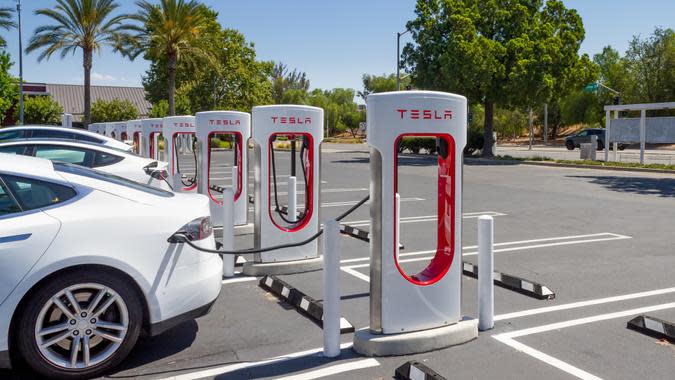Manchin Reverses Course: 4 Things You Need to Know About the Inflation Reduction Act

Sen. in a stunning reversal, which came as a surprise to both Democrats and Republicans -- and Senate Majority Leader Chuck Schumer agreed to a deal on climate change and healthcare on July 27, in order to fight inflation.
See: Think US Inflation is High? Here's How it Compares to Other Countries
Find: 5 Times Inflation Is Actually Good for Your Finances
"I now propose and will vote for the Inflation Reduction Act of 2022. Rather than risking more inflation with trillions in new spending, this bill will cut the inflation taxes Americans are paying, lower the cost of health insurance and prescription drugs, and ensure our country invests in the energy security and climate change solutions we need to remain a global superpower through innovation rather than elimination," Manchin said in a statement.
The White House also issued a statement. President Joe Biden said that he offered his support for the agreement the senators had reached.
"I will have more to say on this later. For now, I want to thank Senator Schumer and Senator Manchin for the extraordinary effort that it took to reach this result," Biden said in the statement. "If enacted, this legislation will be historic, and I urge the Senate to move on this bill as soon as possible, and for the House to follow as well."
Schumer, meanwhile, said in a joint statement that "the investments will be fully paid for by closing tax loopholes on wealthy individuals and corporations."
According to a summary of the bill, it would raise $739 billion in revenue, and investments would total $433 billion, and represent a $300 billion deficit reduction.
While details are still being worked out, here's what we know so far.

Climate change
The Inflation Reduction Act would lower energy costs, increase cleaner production and reduce carbon emissions by 40% by 2030, according to the summary. The act would spend $369 billion on energy security and climate change, according to Congressional Budget Office (CBO) estimates in the summary.
See: Food Prices and Security Hit by 'Heatflation' as Summer Heat Wave Ravages Crops Worldwide

Healthcare
The act would invest $64 billion in the Affordable Care Act (ACA) extension. It would also allow Medicare to negotiate drug prices and cap out-of-pocket costs to $2,000.
"In addition, the expanded Affordable Care Act program will be extended for three years, through 2025," Schumer said in the statement.
In addition, it would lower ACA health care premiums for millions of Americans, according to the summary.
"With this agreement, we have a chance to make prescription drugs cheaper by allowing Medicare to negotiate lower prices and we can lower health insurance costs for 13 million Americans, by an average of $800 a year, for families covered under the Affordable Care Act," Biden said in the statement.
Learn: Why Are 40% of Americans Struggling With Healthcare Debt?

Revenue raised
The proposal would set a 15% corporate minimum tax, which would raise $313 billion, according to the summary.
"It is commonsense that a domestic corporate minimum tax of 15% be applied only to billion-dollar companies or larger, ensuring that America's largest businesses are no longer able to operate for free in our economy," Manchin said in the statement. "Furthermore, to avoid inevitable partisan gamesmanship and increase confidence in the fairness of the tax system, tax reform should never put U.S. businesses at a disadvantage against international competitors."
In addition, prescription drug price reform would raise $288 billion and Internal Revenue Service (IRS) tax enforcement would raise $124 according to CBO estimates. Meanwhile, the carried interest loophole would raise $14 billion, according to Joint Committee on Taxation estimates.
Find Out: Last Year's Global Minimum Tax Agreement Is Delayed Further

Electric Vehicles (EVs)
The act would extend the $7,500 in tax credits but puts a cap on salaries. For joint returns, it would be $150,000, $112,500 for a head of household and $75,000 for a single taxpayer, according to the text of the bill.
Discover: The 7 Cheapest Electric Cars You Can Buy in 2022
Learn: Biden Sets Standards for Charging Electric Vehicles
In addition, buyers of used cars could receive a $4,000 credit.
This article originally appeared on GOBankingRates.com: Manchin Reverses Course: 4 Things You Need to Know About the Inflation Reduction Act
